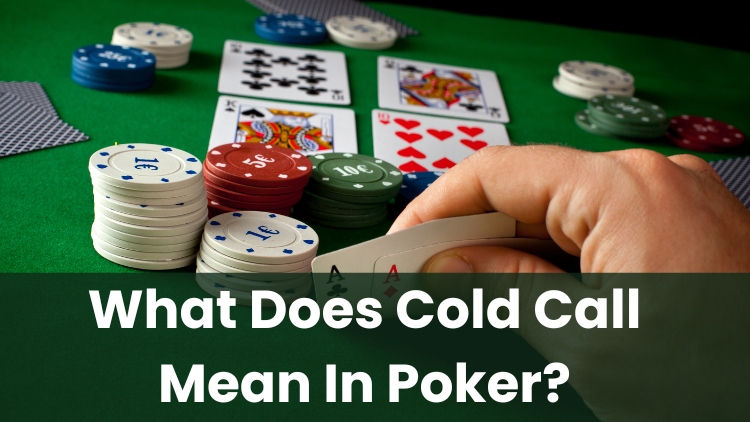
Learning poker terminology can seem difficult at first, but once you start to understand the key terms, the game becomes much easier to follow and more enjoyable to play.
One term you may have come across when playing is “cold call.” It’s a concept that can potentially influence the way you play and how you read your opponents at the table.
It’s worth exploring what a cold call actually is and why players choose to use it. Getting to grips with terms like this can help you feel more confident in your decisions and improve your overall strategy.
In this blog post, we'll explain what a cold call is in poker and provide you with various scenarios where cold calling may seem like a wise decision.
Whether you’re a beginner or looking to refresh your knowledge, understanding this part of the game can potentially improve your poker performance.
What Is a Cold Call In Poker?
In poker, a "cold call" is when you call a bet after there have already been one or more raises in the same round without contributing to the current round.
For example, imagine you're playing poker, and a player places the first bet before another player raises it. When it's your turn, instead of raising the bet yourself, you choose to match the latest amount without having already contributed to the current round.
A cold call is different from a regular call because it happens after a raise has already taken place. You’re not increasing the bet or folding your hand but calling the raised amount and staying in the game.
Players may decide to cold call for various reasons. You may potentially have a good hand but don’t want to commit to a bigger raise, or you may be trying to keep your strategy hidden from other players.
When Do You Cold Call In Poker?
Knowing when to cold call in poker can be a useful skill, and deciding when to do this can potentially make a big difference to your game. A cold call is when you call a raise without having previously put any chips in the pot.
Cold Calling Against Aggressive Players
If you're playing against aggressive opponents who raise often, cold calling can be a smart way to handle them. Instead of re-raising and risking more chips, you simply call their bet and see how the hand develops.
This approach keeps you in the game without overcommitting, allowing you to potentially gather more information about their strategy. It can also make them potentially rethink their next move, especially if they assume you have a strong hand.
Cold Calling With Pocket Pairs
If you have a pocket pair, which are two cards of the same rank, you may consider cold calling. Pocket pairs can be strong; however, they don’t guarantee a win on their own. By calling rather than raising, you get to see the community cards and find out if your hand improves.
If you hit three-of-a-kind, your hand becomes much stronger; however, if the board shows higher cards, you may need to be cautious, as other players may potentially have better hands.
Cold Calling When Opponents Seem Weak
If you think the other players don’t have strong hands, cold calling can be a good way to stay in the hand without taking unnecessary risks, allowing you to see how they bet and react before deciding your next move.
Watching how they play can potentially give you clues about their hand strength. If they hesitate or check a lot, it may be a sign they’re not confident, which could potentially give you an opportunity to win the hand without having to bet big.
Cold calling can be useful in the right situations; however, it’s important to stay aware of the risks. Think about your hand, your opponents, and how the game is playing out before making your decision.
What Is The Difference Between Cold Call And Overcall?
As you explore poker strategy, you'll encounter various terms that sound similar but have distinct meanings. Two terms you may come across are "cold call" and "overcall." Although they both involve calling a bet, they're used in different scenarios.
A cold call happens when you call a raised bet without having put any chips in the pot during that round of betting. You may face one or more raises, and instead of raising again or folding, you choose to call these bets directly.
On the other hand, an overcall comes into play when you call a bet after one or more players have already called a preceding raise. For instance, if a player raises, another calls, and it's your turn next, choosing to match the bet is an overcall.
Cold calls are made directly in response to raises, while overcalls follow another player's decision to call a raise. Understanding these differences can help you make more strategic choices at the poker table, allowing you to adjust your plays according to the situation.
Always remember to gamble responsibly for an enjoyable poker experience. Ensure your poker experience remains safe and entertaining by setting limits to your playing time, sticking to a strict budget within your means and making use of any responsible gambling tools available.
*All values (Bet Levels, Maximum Wins, etc.) mentioned in relation to this game are subject to change at any time. Game features mentioned may not be available in some jurisdictions.
**The information provided in this blog is intended for educational purposes and should not be construed as betting advice or a guarantee of success. Always gamble responsibly.
